

Privacy and anonymity. How to Be an Individual in Age of the Echo Chamber. By Steven Mazie By BRUCE PEABODY, guest blogger Last week, we considered how M.T.
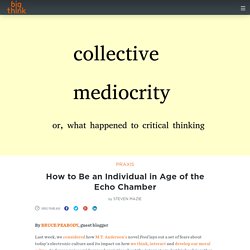
Anderson’s novel Feed lays out a set of fears about today’s electronic culture and its impact on how we think, interact and develop our moral selves. Anderson voices widespread anxieties about the internet age, but his book is rather short on solutions and hope. Open-Minded Man Grimly Realizes How Much Life He's Wasted Listening To Bullsh... CLEVELAND—During an unexpected moment of clarity Tuesday, open-minded man Blake Richman was suddenly struck by the grim realization that he's squandered a significant portion of his life listening to everyone's bullshit, the 38-year-old told reporters.
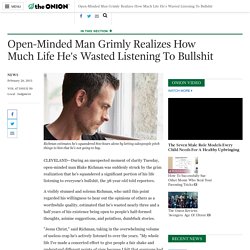
A visibly stunned and solemn Richman, who until this point regarded his willingness to hear out the opinions of others as a worthwhile quality, estimated that he's wasted nearly three and a half years of his existence being open to people's half-formed thoughts, asinine suggestions, and pointless, dumbfuck stories. Generational Media Consumption. It is considered intuitive that younger people use more diverse devices than older people in order to consume media – but does that mean older adults don’t use any technology to get their news or enjoy television shows and movies?
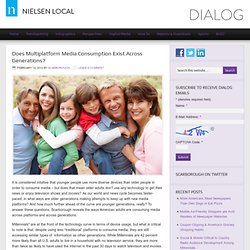
As our world and news cycle becomes faster-paced, in what ways are older generations making attempts to keep up with new media platforms? And how much further ahead of the curve are younger generations, really? To answer these questions, Scarborough reveals the ways American adults are consuming media across platforms and across generations. Millennials* are at the front of the technology curve in terms of device usage, but what is critical to note is that, despite using less “traditional” platforms to consume media, they are still accessing similar types of information as other generations. For Baby Boomers*, radio and newspaper are the desired methods for media consumption, though the devices they use for these activities are perhaps surprising. This Video Will Have You Completely Rethink How You Conduct Yourself Online And In Person (Video)
World• Robert Gordon • We, as human beings, think that through social networks, we’ve somehow become more social creatures.
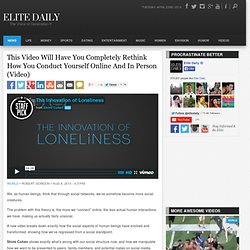
The problem with this theory is, the more we “connect” online, the less actual human interactions we have, making us actually fairly unsocial. Did These Words Really Come Out Of Conan's Mouth? Generational audience habits. News organizations have been confronting the problem of a shrinking audience for more than a decade, but trends strongly suggest that these difficulties may only worsen over time.
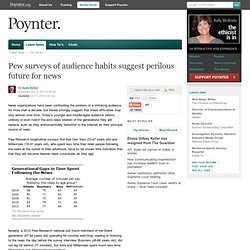
Today’s younger and middle-aged audience seems unlikely to ever match the avid news interest of the generations they will replace, even as they enthusiastically transition to the Internet as their principal source of news. Pew Research longitudinal surveys find that Gen Xers (33-47 years old) and Millennials (18-31 years old), who spent less time than older people following the news at the outset of their adulthood, have so far shown little indication that that they will become heavier news consumers as they age. Notably, a 2012 Pew Research national poll found members of the Silent generation (67-84 years old) spending 84 minutes watching, reading or listening to the news the day before the survey interview. Younger generations just don’t enjoy following news Older Americans’ habits show little change. Logical Form. First published Tue Oct 19, 1999; substantive revision Mon Jun 22, 2009.

15 Tools Every Social Media Manager Should Use. This post was originally published on Feb 4, 2014 Smart businesses know that social media is a power to be reckoned with: social media channels create a direct line of communication between your company and consumers and give anyone with an Internet connection instant access to the latest buzz around your products or services.
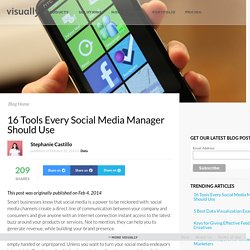
Not to mention, they can help you to generate revenue, while building your brand presence. Let that marinate for a second. This potential for a triple treat is no task to walk into empty handed or unprepared. Unless you want to turn your social media endeavors into a triple threat, you should develop a strategy, based on as much knowledge as possible about your audience and their behavior. The 16 tools below will help you and your social media manager take on the complexity of the job. 1.
Pricing: Free 2. This free, easy-to-use Twitter management tool allows you to oversee all aspects of your Twitter account(s) in one interface. Facebook for Beginners. Update: This post was updated October 2013 to reflect current statistics and tools.
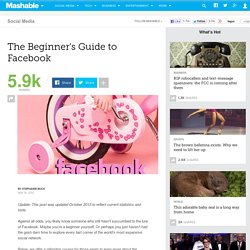
Against all odds, you likely know someone who still hasn't succumbed to the lure of Facebook. Maybe you’re a beginner yourself. Or perhaps you just haven’t had the gosh darn time to explore every last corner of the world’s most expansive social network. Below, we offer a refresher course for those eager to learn more about the basics of Facebook. Let’s take a social stroll through the network’s main features, policies and culture norms. Even if you’re a pro, it’s fun to look at the platform through a beginner’s eyes. 1. Before you begin searching for friends, it’s important to complete your Timeline (aka your personal profile), which includes everything from uploading a profile picture and cover photo to outlining your employment history to determining your relationship status (OK, that’s optional). Check out these additional resources for building the best Timeline: 2. 3. 4. 5 Reasons Listicles Are Here to Stay, and Why That's OK.
Image: IS/Getty Lists are everywhere.

They’re the bread and butter of sites like Cracked and BuzzFeed, and regular content or sporadic filler at dozens more. (Yes, even WIRED.)